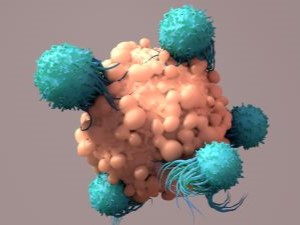Immunotherapy drugs that harness a patient’s immune system to fight cancer have become an important treatment for a subset of patients with certain cancers. A team co-led by investigators from Brigham and Women’s Hospital has uncovered new findings about why some patients fail to respond to these drugs. The research suggests new approaches for making the medications more effective.
In a paper published in Cancer Cell in September 2023, the investigators report for the first time that the gene MTAP appears to play a part in the efficacy of checkpoint blockade drugs, specifically by regulating the infiltration of immune cells in the tumor microenvironment. The MTAP gene is found on chromosomal region 9p21, which also contains the cell-cycle regulator genes CDKN2A and CDKN2B and is known to be frequently deleted in tumor cells.
“Analysis of clinical data collected from melanoma and bladder cancer patients suggested that those with deletions of MTAP seem to respond poorly to immunotherapy,” says Elio Adib, MD, a resident in radiation oncology at the Brigham and the paper’s co-first author. “What we ultimately found is that deletion of MTAP is associated with tumors that have decreased infiltration of immune cells—they are ‘cold’ tumors.”
Teasing out the Role of the MTAP Gene
The starting point for this research was the analysis of samples from patients treated with checkpoint blockade drugs at Brigham and Women’s Hospital. About 200 patients had been treated for melanoma, and about 150 had been treated for bladder cancer. The patients were divided into two groups, based on whether they had the MTAP gene present or deleted in their tumor cells. Their tissues were then analyzed for deletions in CDKN2A and CDKN2B.
“We wanted to dissect this a bit more to see whether MTAP or the cell-cycle regulators are the culprit,” Dr. Adib says. “We know that deletions of CDKN2A and CDKN2B are correlated with poor survival.” The analysis revealed that the loss of MTAP, but not of CDKN2A/B alone, is necessary to convey detrimental effects.
Importantly, tumors with deleted MTAP were found to have far fewer tumor-infiltrating lymphocytes (TILs), a central contributor to the effectiveness of checkpoint blockade drugs. The findings from the patient data were validated using datasets from clinical trials conducted at other institutions.
Exploring MTAP Function in Mouse Models of Cancer
The investigators took their findings back to the lab, creating cell lines of melanoma and bladder cancer that had deletions of the MTAP gene. Then, they placed those cells subcutaneously in mice and studied the tumors that developed. The investigators found that the tumors in the mice had low levels of TILs—just as they had observed in the patient samples.
To test whether correcting the MTAP deficiency could boost immune infiltration, the tumors were injected with a pegylated form of the MTAP enzyme. This led to reduction in MTA levels and immune invasion of the tumors. “This showed us that the deficiency could be reversible,” Dr. Adib explains.
Boosting Immune Infiltration in Tumors
Although the experiments in mice confirmed that the manipulation of MTAP levels increased immune infiltration, this particular approach isn’t necessarily the best one to develop for patients. Many tumors would be difficult to access, and the potential side effects are unknown.
A better approach might be to combine checkpoint blockade drugs with other drugs that deplete MTA and allow immune cells into the tumor, Dr. Adib says. There are two different pathways hypothesized to mediate the connection between MTAP and the immune response: One is the adenosine pathway, and the other involves the enzyme PRMT5. Both will be explored in future studies.
“The next step would be trying to block these pathways directly and seeing whether we can achieve the same results,” Dr. Adib says. “There is already some work happening on the development of drugs that act on one or both of these pathways. We hope our work provides evidence that, in terms of finding therapeutics for patients with tumors that harbor this genetic alteration, these are pathways we should be going after.”
Dr. Adib credits the importance of collaboration in conducting studies like these, which require so many areas of expertise. His mentor, Brigham senior physician David Joseph Kwiatkowski, MD, PhD, was one of the paper’s senior authors, and the research was co-led by investigators at the University of Texas at Austin.
